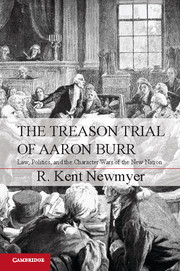Book contents
- Frontmatter
- Contents
- Acknowledgments
- Introduction
- Chronology of the Conspiracy and Associated Trial Proceedings
- Prologue A Mind-Jostling Trial
- 1 Jefferson and Burr on the Road to Richmond
- 2 Jefferson and Marshall Square Off
- 3 Legal Theater in Richmond
- 4 Treason Law for America
- 5 Judging the Judge
- Epilogue
- Index
- References
5 - Judging the Judge
Published online by Cambridge University Press: 05 October 2012
- Frontmatter
- Contents
- Acknowledgments
- Introduction
- Chronology of the Conspiracy and Associated Trial Proceedings
- Prologue A Mind-Jostling Trial
- 1 Jefferson and Burr on the Road to Richmond
- 2 Jefferson and Marshall Square Off
- 3 Legal Theater in Richmond
- 4 Treason Law for America
- 5 Judging the Judge
- Epilogue
- Index
- References
Summary
“The nation will judge both the offender and judges for themselves.”
Jefferson to William B. Giles, April 20, 1807“…His Honor did not for two days understand either the questions or himself…”
Burr on Marshall, September 20, 1807“Our Treason Laws may be defective, but I believe Marshall’s Conduct strictly and correctly legal as the Laws now stand.”
John Adams to John Quincy Adams, February 12, 1808To judge Marshall’s performance as trial judge – to see him as his enemies saw him – one needs to remember that the great chief justice was not yet great in 1807. To be sure, he was a popular figure in Richmond, where he and his family had resided since 1780. Thanks to his bold diplomacy in the XYZ affair in 1798, he was also a celebrated hero. Those in a position to know, friend and foe alike, agreed that he was a uniquely gifted lawyer. As evidence of promised greatness, there was his opinion in Marbury v. Madison, but that opinion had not yet achieved iconic status and neither had the man who wrote it. Whether Marshall would be a great chief justice – or indeed, whether he would be the first chief justice to be impeached – was all yet to be determined.
Virginia Republicans, numerous and well placed in 1807 and spurred on by a popular president, had decided feelings about that question. They remembered Marshall as Virginia’s leading Federalist in the 1790s, a closet Hamiltonian named to head the Supreme Court by departing Federalist President John Adams to subvert President-elect Jefferson’s democratic “revolution”; not for a moment did they believe that a judicial robe neutralized Marshall’s partisan instincts. As for Marbury: Rather than a mark of genius, it was proof final of his aggrandizing agenda.
- Type
- Chapter
- Information
- The Treason Trial of Aaron BurrLaw, Politics, and the Character Wars of the New Nation, pp. 143 - 179Publisher: Cambridge University PressPrint publication year: 2012

